I suppose there comes a period in all of our lives where we start over spiritually — cutting off toxic connections, practicing staying in the moment a lot more, reminding yourself you're enough, etc.
In my case, toxic relationships didn't just constitute those who betrayed but also friends who became triggers. Triggers for anger, pain, sadness, but most importantly, self-hate. People who have changed for the better, but their attitude and possibly, bond with you has not. No matter what they did in the past, it's the struggle with the present relationship with them that begs for a severance. You're torn apart between all the times they made you feel unloved and all the times they made you feel loved.
The subtlest indicator is the way you feel around them — do you feel powerless such that you can't get a hold on your emotions, swaying from one side of the emotional spectrum to the other? What I've realized is the feeling of powerlessness is a blanket for an inner conflict: believing you're unlovable and unworthy. It's easier to deflect and blame than look within and understand why you're hurting. Much easier to focus on how they caused trust issues and why you both never resolved them than recognize what's stopping you from trusting them now.
The relationship turns toxic when no matter what they say, you take everything at face value instead of simply accepting their love, contemplating who is wrong this time, remembering the times they wronged you, triggering the exact emotion felt during that period, letting in more painful thoughts, feeling worse with every thought, and thus, embarking down the self-hate spiral. It's madness.
Cutting such people off then has usually got more to do with you than to do with them, a fact usually realized through distance and isolation. They say you can't love someone unless you love yourself first. I disagree. You can't allow yourself to be loved by someone until you love yourself. You need to forgive and accept yourself fully before you can offer a love that is pure, secure, and honest at its core. That isn't riddled with trust issues and bound by insecurities.
That's hard work — building and strengthening your relationship with yourself in order to let in the goodness the world has to offer. The first step is acceptance. If you feel guilt, shame, pain, or anger, just accept it. When you accept, you stop defending yourself. This ends that inner battle where you go back and forth role-playing judge, jury, defendant, and prosecutor with your thoughts and self. Because that's a court case you will never win.
The second step is an invitation. Inviting is easier than ridding. If the issue you struggle with the most is feeling unlovable, you need to invite love. Not necessarily the love of another, but the love for self. That means different things for everybody. Thinking of how you wish to be and are loved helps.
For instance, I know my mom loving me means she trusts me. My best friends loving me means they accept my flaws, work around it, and pull me up when the world weighs me down. My brother loving me means he puts in the effort to figure ways to spend more time with me. Their love is my source of strength.
Similarly, loving my mom means standing up for her even when my voice shakes, being there for her, and helping her focus on gratitude. Loving my best friends mean being their #1 cheerleader because nothing makes me happier than seeing them happy and doing whatever I can to support that happiness. Loving my brother means treating him as an equal, disciplining him with love, and wholeheartedly celebrating his presence and existence. That's how I expect to be loved and hope to love.
So, applying your definition of love to yourself by being gentle instead of harsh when things go awry, letting go of triggering friends, letting new people in to forgive old ones, focusing on your relationship with yourself first rather than looking to replace that void with a romantic partner, building your self-worth on inner peace, taking care of your body instead of punishing it, listening to how your heart responds to certain people and situations, learning a little every day, and offering positive reinforcement against your biggest insecurity ("I am love, I am loved, I can love") shifts the focus from reducing self-hate to increasing self-love. That's how you win a court case against yourself.
















